
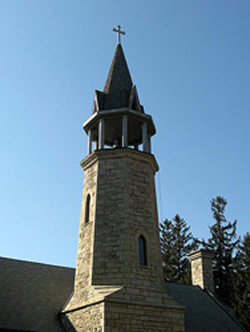 |
The Praise of Bells
A call from God is how a Cistercian vocation is born. Throughout the course of a monk's or nun's day, this divine call finds expression in the sound of bells that call us to prayer, to spiritual reading, to manual labor, or to simple enjoyment of the company of our brothers and sisters. When night falls, the heart of a Cistercian savors the impressions of a day in which body, mind, and spirit have been formed by Christ whose yoke is easy and whose burden is light. We remember the gentle rhythms of prayer chants, the scent of a well oiled tractor rolling through fresh cut fields, the way aged wooden floorboards retain the smell of burnt incense, the heaviness of weary legs stretched out on a simple hardwood bed prepared with fresh laundered sheets. It is remarkable how swiftly the days pass in a monastery. At days end, a last bell is heard whose music delights for a moment and passes away — like a life given to God.
|
|
Keeping Vigil
"Keep watch,!" the Lord exhorts us in the gospel, "I am coming at the moment you least expect." Rising before dawn, we keep vigil, fostering in our hearts, a joyful anticipation of the Lord's return. Maintaining silence and refraining from work, each of us keeping vigil is alone and yet in loving solidarity, as we pray for one another and for all our brothers and sisters in the world: those obliged to work at night, those, who in their suffering cannot sleep, those who use the night to do evil, and those who are afraid of the day about to dawn. Our prayer is that all these may be brought into the light of Christ's never ending day.
|
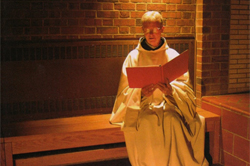 |
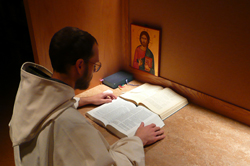 |
Lectio Divina
God comes to us through nature, art, friendships, joy and suffering, but the deepest meaning of these experiences must be illuminated by the Word of God. Hence, each day a Cistercian devotes time to reading and meditating upon the Word of God, ("Lectio Divina"Lectio Divina (Divine Reading) is the reading of Holy Scripture or a spiritual book with a devotional intent, for the purpose of a conversion of one's life through reflection on the mysteries of salvation, and by this means, moving the heart to prayer which issues finally into union with God in contemplation.), allows it to awaken in him a heartfelt response in prayer, and surrenders himself to silent loving contemplation of the mysteries of Christ. Here, in wordless communion with the Divine Word in whom he was created, he is born again and becomes a living sign of the coming of God's reign into the world.
|
Celebration of the Eucharist
The source and summit of our life as a community, the mystery of the mass is where we, together with the whole church, celebrate our unity in faith as the body of Christ. Remembering that desire for which Christ died, the desire that "all might be one," we offer the Eucharist as a powerful means by which the painfully divided human family might be healed and reconciled.
|
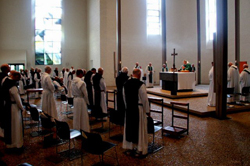 |
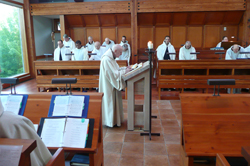 |
The Liturgy of the Hours
In the person of Jesus Christ, history becomes mystery. The most mundane event of the day is a sacrament of God's presence to us and a means for us to be present in love and obedience to God. Seven times a day, monks and nuns interrupt their activities, gather in church, sing praise to our Creator and listen prayerfully to the word of God. Through this exercise of consecrating each successive phase of the day, we discover its deepest meaning and return it as a gift to God.
|
Manual Labor
Recognizing its power to purify our hearts of the effects of sin, Cistercians enthusiastically embrace manual labor as an integral part of each day. Engaged in various tasks that support the common life of the monastery, we are mindful of being in solidarity with countless men and women all over the world who must do physical work to earn a living. Most importantly, we celebrate and enjoy manual labor as a means by which the Lord carries on His work of creation in the work of our hands.
|
 |
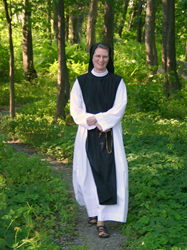 |
The Monastic "Interval"
The crown of God's creation is the freedom of a child of God—an interior freedom a Cistercian gradually reclaims by a balanced life of discipline and holy leisure. Living in fidelity to a rule of life inspired by the Gospel, we grow in our capacity to love which finds expression in monastic "intervals", periods of quiet between community exercises given to intimate experience of God's friendship in prayer and interaction with our brothers and sisters in the monastery.
|
Retiring for the Night
The cell is a sacred place because it is where, by God's grace experienced in prayer, the monk is transformed into a new creation. As darkness falls, we return, each of us, to our cell, grateful for having spent another day in the Lord's service. Entrusting ourself to the Lord's protection during the night, each of us anticipates that new day which will be a sign of Christ's resurrection from the dead, and prays: "Into your hands O Lord, I commend my spirit!"
|
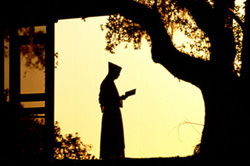 |
|



